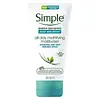What's inside
What's inside
 Key Ingredients
Key Ingredients

 Benefits
Benefits

 Concerns
Concerns

 Ingredients Side-by-side
Ingredients Side-by-side

Water
Skin ConditioningCyclopentasiloxane
EmollientDimethicone
EmollientStearic Acid
CleansingNiacinamide
SmoothingIsohexadecane
EmollientAcrylates/C10-30 Alkyl Acrylate Crosspolymer
Emulsion StabilisingAluminum Starch Octenylsuccinate
AbsorbentCarbomer
Emulsion StabilisingCetyl Alcohol
EmollientCitric Acid
BufferingDimethiconol
EmollientDisodium EDTA
Ethylhexylglycerin
Skin ConditioningGlycerin
HumectantHamamelis Virginiana Leaf Water
AstringentPEG-100 Stearate
Phenoxyethanol
PreservativeSodium Hydroxide
BufferingThymus Vulgaris Flower/Leaf Extract
MaskingTocopherol
AntioxidantTocopheryl Acetate
AntioxidantTriethanolamine
BufferingZinc PCA
HumectantWater, Cyclopentasiloxane, Dimethicone, Stearic Acid, Niacinamide, Isohexadecane, Acrylates/C10-30 Alkyl Acrylate Crosspolymer, Aluminum Starch Octenylsuccinate, Carbomer, Cetyl Alcohol, Citric Acid, Dimethiconol, Disodium EDTA, Ethylhexylglycerin, Glycerin, Hamamelis Virginiana Leaf Water, PEG-100 Stearate, Phenoxyethanol, Sodium Hydroxide, Thymus Vulgaris Flower/Leaf Extract, Tocopherol, Tocopheryl Acetate, Triethanolamine, Zinc PCA
Water
Skin ConditioningHomosalate
Skin ConditioningCera Alba
EmollientAloe Barbadensis Leaf Juice
Skin ConditioningOctocrylene
UV AbsorberEthylhexyl Salicylate
UV AbsorberIsopropyl Palmitate
EmollientCetearyl Alcohol
EmollientCyclopentasiloxane
EmollientCyclohexasiloxane
EmollientCeteareth-20
CleansingButyl Methoxydibenzoylmethane
UV AbsorberHydroxyacetophenone
AntioxidantCarbomer
Emulsion StabilisingBenzyl Alcohol
PerfumingSaccharide Isomerate
HumectantPhenoxyethanol
PreservativeSodium Stearoyl Glutamate
CleansingTriethanolamine
BufferingTocopheryl Acetate
AntioxidantParfum
MaskingCitric Acid
BufferingSodium Chloride
MaskingWater, Homosalate, Cera Alba, Aloe Barbadensis Leaf Juice, Octocrylene, Ethylhexyl Salicylate, Isopropyl Palmitate, Cetearyl Alcohol, Cyclopentasiloxane, Cyclohexasiloxane, Ceteareth-20, Butyl Methoxydibenzoylmethane, Hydroxyacetophenone, Carbomer, Benzyl Alcohol, Saccharide Isomerate, Phenoxyethanol, Sodium Stearoyl Glutamate, Triethanolamine, Tocopheryl Acetate, Parfum, Citric Acid, Sodium Chloride
Ingredients Explained
These ingredients are found in both products.
Ingredients higher up in an ingredient list are typically present in a larger amount.
Carbomer is a polymer of acrylic acid. Its main role is to create a gel consistency.
A high amount of carbomer can cause pilling or balling up of products. Don't worry, most products contain 1% or less of carbomer.
Citric Acid is an alpha hydroxy acid (AHA) naturally found in citrus fruits like oranges, lemons, and limes.
Like other AHAs, citric acid can exfoliate skin by breaking down the bonds that hold dead skin cells together. This helps reveal smoother and brighter skin underneath.
However, this exfoliating effect only happens at high concentrations (20%) which can be hard to find in cosmetic products.
Due to this, citric acid is usually included in small amounts as a pH adjuster. This helps keep products slightly more acidic and compatible with skin's natural pH.
In skincare formulas, citric acid can:
While it can provide some skin benefits, research shows lactic acid and glycolic acid are generally more effective and less irritating exfoliants.
Most citric acid used in skincare today is made by fermenting sugars (usually from molasses). This synthetic version is identical to the natural citrus form but easier to stabilize and use in formulations.
Read more about some other popular AHA's here:
Learn more about Citric AcidCyclopentasiloxane, or D5, is a silicone used to improve texture of products and trap moisture.
D5 is considered lightweight and volatile. Volatile means it evaporates quickly after application. Once evaporated, D5 leaves a thin barrier that helps keep skin hydrated.
It is also an emollient. Emollients help soften the skin and prevent water loss. Silicones create a silky texture in products. D5 helps other ingredients become more spreadable.
Studies show D5 is safe to use in skincare products. We recommend speaking with a skincare professional if you have concerns.
Learn more about CyclopentasiloxanePhenoxyethanol is a preservative that has germicide, antimicrobial, and aromatic properties. Studies show that phenoxyethanol can prevent microbial growth. By itself, it has a scent that is similar to that of a rose.
It's often used in formulations along with Caprylyl Glycol to preserve the shelf life of products.
Tocopheryl Acetate is AKA Vitamin E. It is an antioxidant and protects your skin from free radicals. Free radicals damage the skin by breaking down collagen.
One study found using Tocopheryl Acetate with Vitamin C decreased the number of sunburned cells.
Tocopheryl Acetate is commonly found in both skincare and dietary supplements.
Learn more about Tocopheryl AcetateTriethanolamine is an emulsifier and pH adjuster. It is created using ethylene oxide and ammonia. This gives Triethanolamine a nitrogen core and a similar scent to ammonia.
As an emulsifier, it prevents ingredients from separating and enhances texture by adding volume to a product.
PH adjusters are common in cosmetic products. The pH of a product can affect the effectiveness of other ingredients. A product with a high pH may also irritate the skin.
Learn more about TriethanolamineWater. It's the most common cosmetic ingredient of all. You'll usually see it at the top of ingredient lists, meaning that it makes up the largest part of the product.
So why is it so popular? Water most often acts as a solvent - this means that it helps dissolve other ingredients into the formulation.
You'll also recognize water as that liquid we all need to stay alive. If you see this, drink a glass of water. Stay hydrated!
Learn more about Water